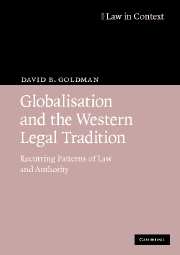Book contents
- Frontmatter
- Contents
- Preface
- 1 Introduction
- Part 1 Towards a Globalist Jurisprudence
- Part 2 A Holy Roman Empire
- Part 3 State Formation and Reformation
- Part 4 A Wholly Mammon Empire?
- Part 5 Competing Jurisdictions Case Studies
- 11 The twenty-first century European community
- 12 International commercial law and private governance
- 13 Conclusion: what is to be done?
- Bibliography
- Index
12 - International commercial law and private governance
Published online by Cambridge University Press: 30 March 2010
- Frontmatter
- Contents
- Preface
- 1 Introduction
- Part 1 Towards a Globalist Jurisprudence
- Part 2 A Holy Roman Empire
- Part 3 State Formation and Reformation
- Part 4 A Wholly Mammon Empire?
- Part 5 Competing Jurisdictions Case Studies
- 11 The twenty-first century European community
- 12 International commercial law and private governance
- 13 Conclusion: what is to be done?
- Bibliography
- Index
Summary
Before retiring to draw conclusions from our Gulliverian travels through the Western legal tradition, a further case study of jurisdictions existing in the same space as other jurisdictions will assist. The lex mercatoria – the international commercial law of merchants – is considered. Immediately, the criticism may be levelled that the choice of the lex mercatoria suffers from a paradigmatic weakness, despite its existence as a jurisdiction in competition with state commercial law. After all, not all of the commercial world relies upon the distinct lex mercatoria and surely commercial laws under various banners are the preserve of societies with a degree of affluence and sophistication. The microeconomic lex mercatoria has been chosen, however, because it illustrates the potential for lived (not coerced) law with great historical survival value and supranational success, minimally reliant upon the state. Together with contract law, the lex mercatoria also lends itself to contemplation about the extent to which laws can be codified or universalised amidst local diversities. (Deserving of recall in this context are the concerns we saw expressed by the Historical School of jurisprudence in the nineteenth century.) Not only relevant to private relationships, we shall also see that the ‘private law’ of contract has encroached into the province of the ‘public law’ of government. Commercial law trends and concerns therefore extend beyond the account of merchants and economics.
The lex mercatoria
Definition
The lex mercatoria derives from its customary and spontaneous nature. It is a merchant-driven, historically developed body of law, independent of national law (or at least relegating domestic laws to the bottom of the list of sources), governing the ‘international, commercial and financial legal order’.
- Type
- Chapter
- Information
- Globalisation and the Western Legal TraditionRecurring Patterns of Law and Authority, pp. 274 - 295Publisher: Cambridge University PressPrint publication year: 2008



